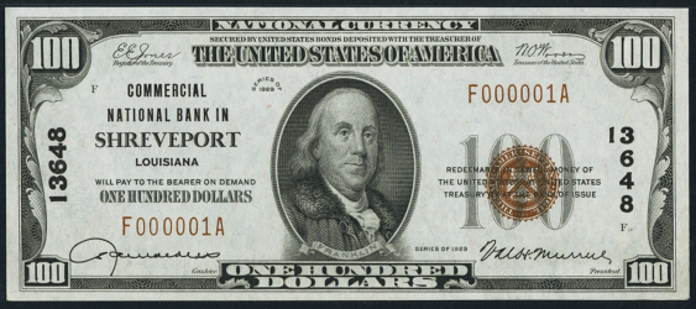One Hundred Dollar Notes › Nationals › 1929 One Hundred Dollar National Bank Notes › Kentucky Charters › 1929 $100 Dry Ridge Kentucky First National Bank
Get Value Now
| Item | Info |
|---|---|
| Series | 1929 |
| Charter | #7012 First National Bank of Dry Ridge, Kentucky |
| Year Chartered | 1903, 514 Banks Chartered |
| City Info | Dry Ridge is a home rule-class city in Grant County, Kentucky, in the United States. The population was 2,191 at the 2010 census, up from 1,995 at the 2000 census. Dry Ridge is located north of the center of Grant County at 38°40?56?N 84°35?47?W? / ?38.68222°N 84.59639°W. It is bordered to the south by the city of Williamstown, the county seat. Interstate 75 passes through Dry Ridge, with access from Exit 159. I-75 leads north 35 miles to Cincinnati and south 49 miles to Lexington. U.S. Route 25 runs through the center of Dry Ridge, leading north 7 miles to Crittenden and south 4 miles to the center of Williamstown. Source: Wikipedia |
| Similar Cities | City name is unique, no others like it. |
| Seal Varieties | Small Brown |
| See Also | If your note doesn't match try: 1. 1929 $100 Federal Reserve Bank Note 2. 1928 $100 Federal Reserve Note 3. 1928A $100 Federal Reserve Note 4. 1934 $100 Federal Reserve Note 5. 1934A $100 Federal Reserve Note 6. 1934B $100 Federal Reserve Note |
| Other Info | 1. Value depends on notes known for charter, condition and market demand. |
| Neat Fact | Portrait of Franklin. Note appearance similar to 1929 Federal Reserve Bank Notes. |
No Obligations Offers and Appraisals
Please submit a good photo or scan. It will be identified and evaluated. Understand there may be subtle differences between the image you see above and your note. Signatures, design, markings and note condition will determine the offer price. Notes in Uncirculated or better condition receive the best offers.
Appraisals can be estimated for wholesale and retail prices. Wholesale is what dealers typically pay. Retail is what a collector might pay. Retail is slightly higher in most cases.
Please visit this page for USA Paper Money Reference. Do not treat this page as a reference guide, it is for appraisal and acquisition purposes only.
